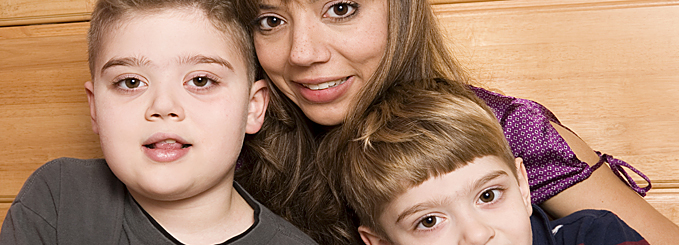
Training in Autism
Positive Behaviour Support Workshops
Please contact Matthew Power for information on training dates.
PBS is a way of supporting people whose behaviour is seen as
challenging. PBS helps people think about the way they support
someone, and how they can give the person the right support.
We are running this course prior to the school summer holidays,
you need to be able to attend both sessions to benefit from the
course.
For more information, or to book a space on this training, contac:
Matthew Power, Forth Valley Services,
Unit 26-31, Block 2, Whitehouse Road,
Springkerse Industrial Estate, Stirling, FK7 7SP
t: 01786 476750 e: forthvalley@enable.org.uk
w: www.enable.org.uk
Download the poster here
Training offered by Stirling and Clackmannanshire Councils
Stirling and Clackmannanshire Council provide training in Autism to families and professionals. All training is available in half or full day courses and is tailored to the needs and requirements of the participants. Examples of training include:
For Parents, Carers and Education Professionals
- What is Autism and how does it affect a child?
- Gender differences in the presentation of Autism Spectrum Disorders
- Challenging behaviours: how to respond?
- Communication issues: what can be done to help?
- Review App to support individuals with autism across needs, i.e. relaxation, learning, communication, socialisation, planning, transition.
- The classroom environment and how to minimise sensory impairment issues?
- Managing a child with Autism at home
- Managing a child with Autism in the community
- Autism and siblings
- Autistic children as visual learners
- Support services available locally
Other possible topics
- Autism Spectrum Disorders (ASD) in Young People and Adults, what is ASD and how does it affect a person?
- Gender differences in the presentation of Autism Spectrum Disorders
- How to identify ASD (red flags for autism in adults and young people)
- Challenging behaviours and criminal issues
- Common misunderstandings i.e. literal understanding of language and inflexibility of behaviour
- How best to communicate with a person with ASD
- Strategies to defuse a crisis
- Sensory difficulties
- Referral to diagnostic services
- Support services available locally
If you have any questions or are interested in receiving training on ASD, please contact:
Lorene Amet
Autism Development Officer
2nd Floor, Municipal Buildings
8-10 Corn Exchange Road
Stirling
FK8 2HU.
Tel: 01786 233 832
e-mail: ametl@stirling.gov.uk
Self-Directed Support- Training to access and implement it offered by In Control Scotland
In Control Scotland aims to support the development of a sustainable system of self-directed support in Scotland where people are in control of and able to direct the – how, when, in what way and by whom – they are supported.
Partnership in Policy programme due to start in Dunblane Hydro in Dunblane on 30th September 2016.
Download the Leaflet
‘Partners in Policymaking’ is an internationally recognised leadership development programme for parents of disabled children (up to the age of 18) and disabled adults, including people with learning difficulties, mental health issues, autism, sensory impairments and physical impairments.
This programme is a chance for participants to gain the knowledge, skills and confidence they need to campaign and advocate for better treatment and social justice for disabled people within our society.
The programme is designed for parents and adults who:
- think that life for disabled children and adults could be better
- want to improve the way things are now, but don’t know where to start Some people on the programme will already be members of groups and organisations who are working for change, while others may be new to this.
By the end of the programme we expect that participants will be better able to contribute to the successful implementation of self directed support.
PLEASE NOTE: This programme is not open to:
- Paid professional staff
- Parents with a disabled child over the age of 18.
People living anywhere in Scotland are entitled to apply for a place.
There are 40 places available.
The programme is free to participants. We will try and make sure people get the support they need to successfully complete this programme, whether this is material on audio tape, sign language interpreters or support to read the materials and carry out the course work. We may also be able to help with financial support, i.e. travel expenses.
What participatants have said about the programme.
“Partners in Policymaking has really changed my life, it has given me the strength and confidence to challenge decisions and fight for what I believe in. I have met some inspirational people and will continue to keep in touch and work together to improve things for the better”
Only 40 places availbale. For more information, contact
June Dunlop, In Control Scotland, c/o Neighbourhood
Networks, Pavilion 5A, Moorpark Court, 25 Dava
Street, Glasgow, G51 2JE
Tel: 0141 440 5250
Email: june.d@in-controlscotland.org.uk
Partners in Policymaking
‘Partners in Policymaking’ is an internationally recognised leadership development programme for parents of disabled children (up to the age of 18) and disabled adults, including people with learning difficulties, sensory impairments and physical impairments.
This programme is free to participants, offering a chance to gain the knowledge, skills and confidence they need to campaign and advocate for better treatment and social justice for disabled people within our society.
The programme is designed for parents and adults who:
- think that life for disabled children and adults could be better
- want to improve the way things are now, but don’t know where to start
Some people on the programme will already be members of groups and organisations who are working for change, while others may be new to this. By the end of the programme participants should expect to be better able to contribute to the successful implementation of self-directed support.
CLICK HERE to for further information on the programme.
CLICK HERE to view a Programme Descriptor.





